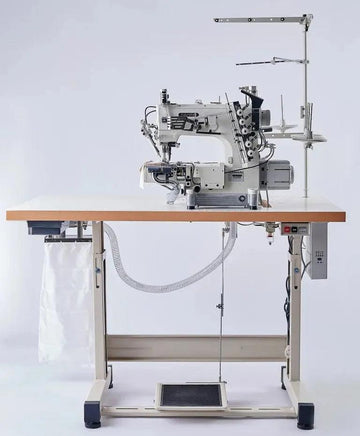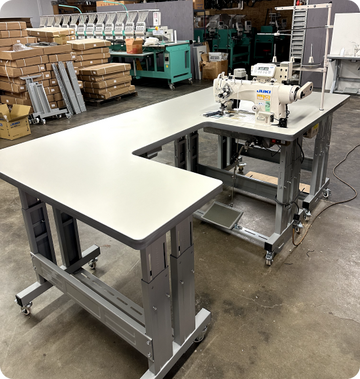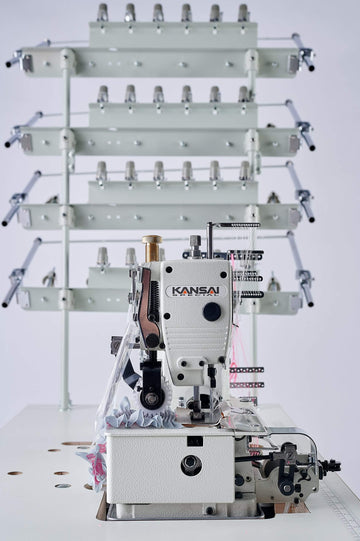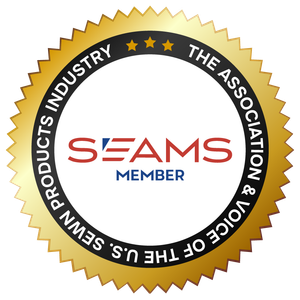Regular sewing machines serve well for simple, small-scale projects. However, if you want your items to look professional when sewn in large volumes, an industrial machine can make a great difference. Since modern sewing units are very diverse, it’s crucial to find the perfect machine that will enhance your productivity and work quality. So, this guide reveals the most efficient tips on how to choose the right industrial sewing machine – the one that matches your needs for power, speed, durability, and price.
Understanding Industrial Sewing Machines
Industrial sewing machines are professional sewing units designed for handling more complex and larger-scale projects than standard domestic or commercial machines. They come in a variety of types, from lockstitch and buttonholing to zigzag, overlock, and belt-loop attaching machines. Use cases are also diverse and typically include clothing, upholstery, car interior, and footwear manufacturing. Here are the principal characteristics that make industrial sewing machines stand out from their domestic counterparts:
-
Continuous operation (often 24/7)
-
Superior stitch quality and accuracy
-
High sewing speeds
-
Durable build
-
Advanced automation capabilities
Key Factors to Consider when Choosing an Industrial Sewing Machine
Here’s what you should keep in mind when choosing an industrial sewing machine for your projects:
Purpose and Sewing Application
Professional machines can handle specific sewing tasks in high volume, and it may be more challenging to use them for other purposes. For example, a model for clothing and textile manufacturing will hardly serve well for sewing fur products or footwear. Depending on the machine’s type, it may perform from just a few to several hundred seam patterns. The number of specialized sewing functions may vary.
The most common industrial machine applications include:
-
Straight stitching
-
Button sewing
-
Heavy-duty sewing
Hence, you should have a clear idea of how you are willing to use the machine so that you can choose the most suitable model for your needs.
Machine Speed and Productivity
Machine speed is measured in stitches per minute, and the greater this value is, the more items you can sew without sacrificing quality. However, it’s also crucial to consider your skill level and the type of fabrics you are working with.
The maximum speed of industrial machines typically ranges from 1,000 to 8,000 sti/min. The most productive models are perfect for large-volume projects but may not be suitable for beginners. As for the fabric type, it’s better to opt for models with a maximum speed of 5,000-8,000 sti/min for sewing lighter materials, and with a speed of 3,000-4,000 sti/min if you work with heavier fabrics (e.g., leather).
Also read: Industrial vs Domestic Sewing Machines
Durability and Build Quality
An industrial machine is a long-term investment, meaning it should serve you well for years. In addition, these sewing tools are often used for prolonged daily operations. With that in mind, manufacturers make industrial machines from robust, heavy-duty materials, enabling them to withstand substantial loads while maintaining their top sewing performance. High build quality also affects machine maintenance. For example, rust-resistant materials provide protection against environmental harm, especially in humid or dusty industrial settings. Moreover, the best models feature advanced oiling mechanisms for consistent lubrication.
Motor Type and Power
Industrial sewing machines are equipped with powerful and resistant motors, which makes them suitable for continuous use. They typically come in two types:
-
Clutch motors: less-efficient motors that consume more electricity. Being suitable for heavy-duty tasks, they still generate more noise and vibration during the sewing process.
-
Servo motors: known for precise speed control and superior performance, servo motors also consume 60-80% less electricity than clutch motors. In addition, they generate less vibration and have lower maintenance requirements.
Additional Features and Automation
The best machines for professional sewing feature a range of automation capabilities, making the work easier, faster, and more comfortable. This includes automatic needle threading and positioning, tension adjustment, thread cutting, and stitch pattern programming.
Industrial machines may also have some useful additions to enhance the sewing process:
-
Free arm
-
Reverse needle movement
-
Twin needle sewing
-
Upper conveyor
-
Backlighting
-
LED display
-
Autonomous power supply
Budget and Cost Considerations
Financial aspects prove to be one of the key considerations for those thinking on how to choose an industrial sewing machine. Indeed, professional units cost more than their domestic counterparts. However, they significantly improve sewing performance, minimize human errors, and reduce labor time, making them more cost-efficient in the long run.
Entry-level industrial machines with a limited number of features are the most affordable – from $500 to $1,000. Mid-range models boast better build quality and functionality, so their cost often varies between $1,000 and $4,000. High-end, fully automated industrial machines are the best sewing solutions available in today’s market. Such models may cost from $4,000 to $40,000+, depending on their features, speed, and performance.
How to Choose the Right Needle for an Industrial Sewing Machine
If you purchase an industrial machine through Prizzi, we clearly state which type of needle is compatible with every model. In case you cannot find this information in the machine specifications and keep wondering "how to choose a needle for my industrial sewing machine?", consider the following factors:
-
Needle system: check out your machine's manual to determine the correct needle system for your model. It will be specified as a group of letters and numbers (e.g., DC × 27).
-
Needle point: there are many types of needle points, so make sure to choose the one that suits your fabrics (round, sharp, leather, etc.).
-
Needle size: choose a needle size based on the thickness of your material. Thin needles are used for thin fabrics, and thick needles – for thick materials.
What to Look for when Buying an Industrial Sewing Machine
The following tips on what to look for in an industrial sewing machine and how to get the best deal will help you a lot:
-
Compare prices from different suppliers and make purchases only through reliable dealers.
-
Choose well-established machine brands (Juki, Kansai, Pegasus, etc.).
-
Opt for machines with at least a 1-year warranty.
-
Get a robust sewing table that withstands the weight of your machine.
-
Check the quality of machine components.
Conclusion
Whenever you decide to buy an industrial sewing machine, Prizzi is here to provide you with an extensive selection of top-quality models for any need. We have been empowering leading manufacturers for over 40 years and can now become your trusted partner on the way to your business success. You can also visit us in South El Monte, Los Angeles, California, or contact our support by phone.
Co-Owner at Prizzi Sewing Machine Co.
Expert in sewing factory workflow optimization











